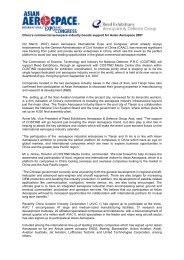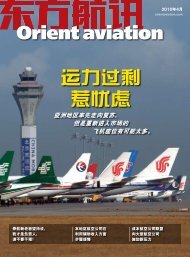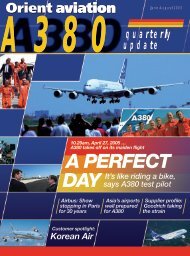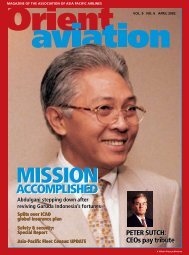China's - Orient Aviation
China's - Orient Aviation
China's - Orient Aviation
- No tags were found...
You also want an ePaper? Increase the reach of your titles
YUMPU automatically turns print PDFs into web optimized ePapers that Google loves.
By Charles Andersonthose aircraft are carried out by Qantas andLufthansa Technik Philippines.Jetstar plans its own line maintenance andsupport for 15 B787s to go into service withJetstar International. No decision has beenmade on heavy maintenance requirementsfor the 85 B787s entering the Qantas group.AeroStrategy’s Stewart said carriers withlarge fleets might want to shop for heavymaintenance separately from components.Their greater need for heavy work makes thema more attractive target for MRO providersmeaning good deals are in the offing.“You have a pret t y competitivemarketplace out there. What it takes to winin airframe heavy maintenance is not what ittakes to win in components,” he said. “Theymight look at those separately because of theman hours generated with widebodies.”That will also play into the hands ofthe region’s MRO companies. “It makesAsian suppliers more competitive. You arenot likely to fly a widebody to Zurich withSR Technics if you have TAECO in Chinaavailable,” said Stewart.Location certainly plays a part whenLCCs look for MRO providers, but theydon’t necessarily have to be at the carrier’shome airport, as in AirAsia’s case. “Thecloser the better because you have less of aferry flight, but there’s no reason why it can’tbe between two and three hours, especiallyif the supplier’s location is on your networkanyway,” said Stewart.T hat is especially t he case fornarrowbodies, which require fewer manhours, therefore making cheaper labourrates less of an issue.HAECO this year signed up to run anMRO joint venture with Air Arabia, whichwill operate A320s out of Sharjah, giving theMiddle East’s first LCC just what a start-upneeds, full support right on its doorstep. Suchproximity also solves the thorny problem ofline maintenance provision, which mightotherwise cut into dispatch times.“There’s a debate as to whether LCCsshould do line maintenance because so manyconsider that core to aircraft availability,which in turn is core to the low-fare businessmodel – quick turnarounds and making sureplanes are dispatched reliably,” said Stewart.Low labour rates also make it a moreattractive proposition for carriers toconsider, while the AirStrategy consultantNeeds vary as LCCs grow“ Size matters with LCCs and fleets increase rapidly,” saidWalter Heerdt, senior vice-president, marketing and salesat Lufthansa Technik (pictured). “MRO requirements differfrom the strong, established network carriers with a variety ofaircraft types.“Our product is very important for a start-up. We help thecustomer get off the ground in terms of maintenance and support.”Staff are seconded to handle the introductory phase and train the carrier’spersonnel. Component and engine services are often part of the deal.Lufthansa has LCCs Air Deccan and Go Airlines of India and Japan’s SkymarkAirlines and Starflyer on its customer list. And its new Hyderabad MRO companywill handle the low-cost staples, the narrowbody A320 and B737.“If you are going to build a facility you have to be sure there’s enough demandaround,” said Heerdt. But he is keen to point out that the demands of legacy andlow-cost carriers are not much different once the latter are up and running.“Aircraft cost a lot of money and nobody can afford to keep an asset like that onthe ground,” said Heerdt. “From that point of view, the turnaround times, liabilityand quality – the requirements of both are identical.”notes the Asia-Pacific’s LCCs are keeneron maintaining their own spares inventorythan in the U.S. and Europe, buying them inand then getting someone to manage themon their behalf. “In the U.S. they want thoseassets off the balance sheet,” said Stewart.Companies supplying a full set of serviceshave to get so involved they almost becomea part of the airline.“The challenge for the Europeancompanies is to be close to your customerand yet still maintain economies of scale inthe inventory and so on,” he said.SR Technics is hoping to transferexperience gained in Europe with many LCCcustomers to carriers in the Asia-Pacific,working in partnership with them as fleetsgrow and consolidation sets in.In particular, it wants airlines to look atits ground-breaking agreement with EasyJetunder which it provides full support for thecarrier’s rapidly expanding A319 fleet. It willtotal 200 by 2010. SR Technics maintainsEasyJet’s older B737s.Through a concept worked out withAirbus’s help, it splits routine checks into‘Asia-Pacific’s LCCs arekeener on maintaining theirown spares inventory than inthe U.S. and Europe’>>>>>>>>>>>>>>>>>>>smaller equalised maintenance checks, or“E-checks” carried out overnight at its hubs.The result is that no aircraft is in the hangarfor prolonged maintenance for five years.“This can only be done if you have perfecttransparency of fleet data, engine monitoringand the respective tools. SR Technics has athand such as an e-customer portal. Theseallow optimal planning and outsourcing suchas line maintenance to third parties, with SRTechnics keeping overall responsibility forperformance and reliability,” said RobertoPace, senior vice-president, sales, for theAsia-Pacific.Cost factors can be different in the regionwhen compared to the mature North Americanand European markets, said Pace, with gainsfor LCCs through lower labour costs balancedby the expense of setting up maintenancepoints throughout their networks.“Most LCCs have a decentralised point topoint network, which means there are severalsmall hubs all needing a consigned stock fortheir components and certain maintenancecapabilities,” he said.“Much more emphasis is put on linemaintenance to resolve minor issues duringvery short turnaround times. For an airlineit can be quite expensive to set up all thesesmall hubs from scratch. An established,experienced [company] can providethese.”NOVEMBER 2007 ORIENT AVIATION 47



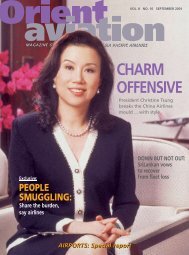
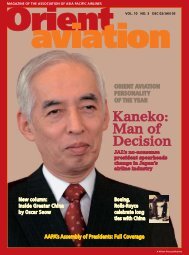
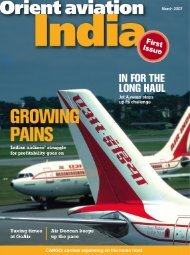
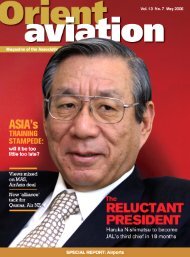
![OAMag-V7N4-Cover [Converted] - Orient Aviation](https://img.yumpu.com/48598575/1/190x255/oamag-v7n4-cover-converted-orient-aviation.jpg?quality=85)

